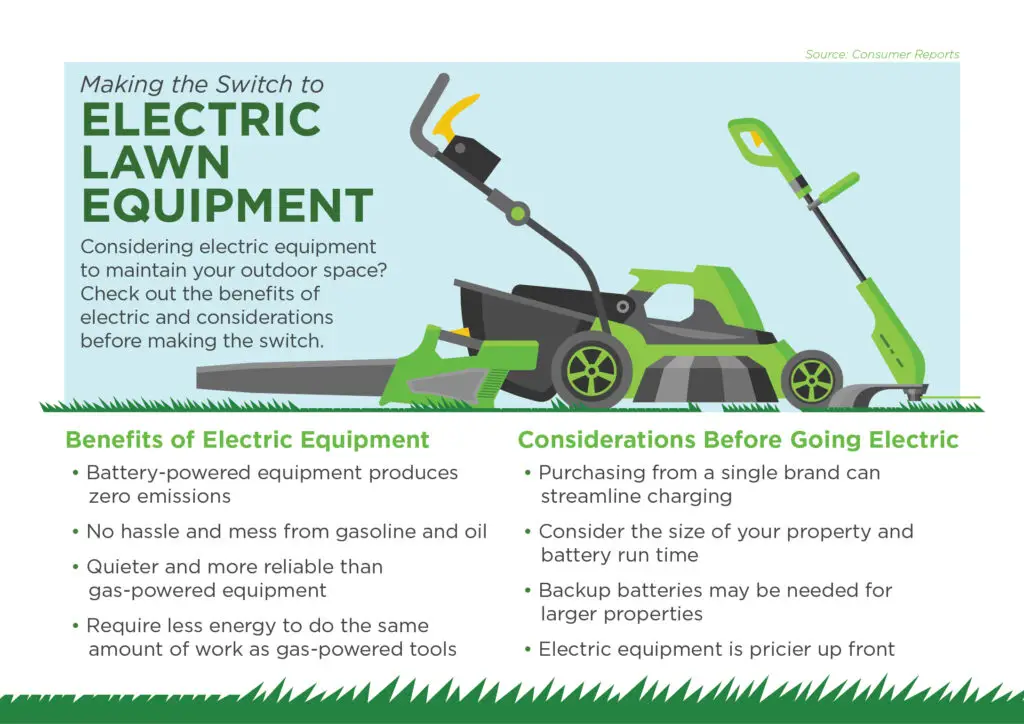By Anne Prince
The landscape of lawn and garden care is evolving, and electric equipment is at the forefront of this change. While electric lawn tools aren’t new, advancements in technology and more options mean prices have become more competitive, making electric equipment an accessible option for many consumers.

Benefits of electric equipment
Electric lawnmowers have come a long way since the days of extension cords tethering you to an outlet. Battery-powered mowers offer the same freedom of movement as gas-powered models but with reduced noise and maintenance.
Battery life was once a major drawback to making the switch to electric lawn tools. But today’s growing demand for electric equipment has resulted in major advancements for lithium-ion batteries, making them more reliable, cost-effective and efficient. For most consumers, electric lawn tools can get the job done just as well as gas-powered models.
Many electric mowers offer push-button starts, and because they are lighter, they are easier to maneuver around tight turns. Improved batteries provide longer run times to tackle larger spaces. Like their gas-powered counterparts, electric mowers are available in push, self-propelled/walk-behind and riding models. And there’s no need to refill gas cans or change oil and air filters, resulting in less hassle and maintenance.
Like mowers, electric blowers, string trimmers and chainsaws have fewer moving parts, require minimal maintenance and are quieter. Because electric tools are generally lighter in weight, they’re also more ergonomic and easier to maneuver. This feature is especially handy for projects that require tools like chainsaws for precise work.
Choose electric equipment to meet Your needs
Electric lawn tools have some limitations, so the size and terrain of your outdoor space are important considerations when purchasing new equipment. When comparing gas-powered and electric mowers, consider the torque rating––this is the driving force behind a blade’s rotation. On average, electric lawnmowers generate less torque than gas mowers. If you have a challenging outdoor space that includes overgrown brush, tall grass, or hills and dips, torque is a key factor.
Choosing the right type and size mower is particularly important for spaces larger than half an acre. If you have a large property, consider purchasing an extra battery to ensure uninterrupted workflow.
Many manufacturers offer interchangeable batteries and chargers, providing flexibility and convenience. Choosing a single brand can ensure charging compatibility across your lawn tools and streamline charging.
While both gas and electric lawn tools can get the job done, electric equipment generally requires less maintenance, is less expensive to operate and is kinder to the environment.
Get green for going green
Electric tools are quietly redefining the way we approach lawn care. If you’re planning to make the switch to electric lawn equipment, check with your electric cooperative to explore any available rebates. Their energy advisors are available to share energy-saving advice to help you save money and clear the path to a greener, more energy efficient future.
Anne Prince writes on consumer and cooperative affairs for the National Rural Electric Cooperative Association, the national trade association representing nearly 900 local electric cooperatives. From growing suburbs to remote farming communities, electric co-ops serve as engines of economic development for 42 million Americans across 56% of the nation’s landscape.




